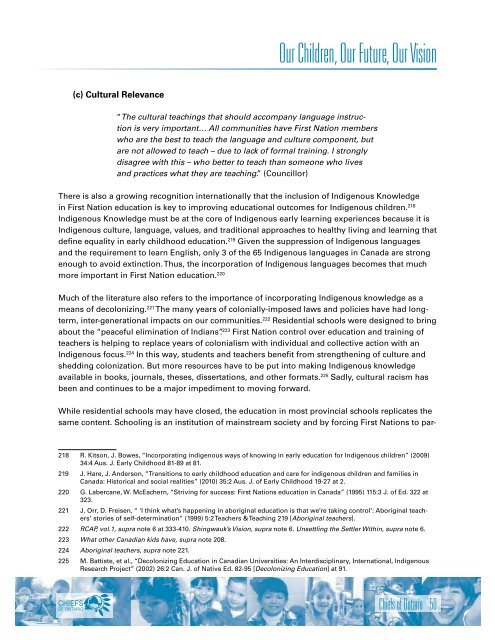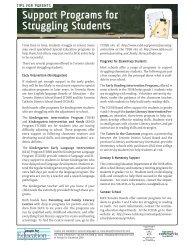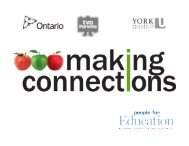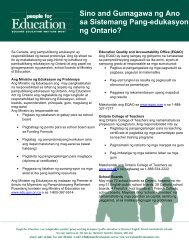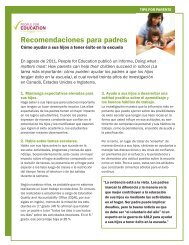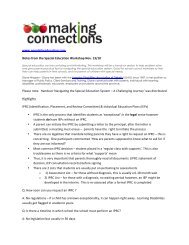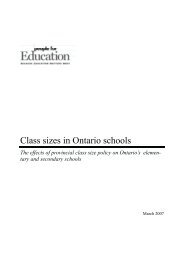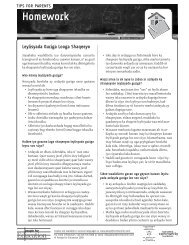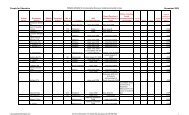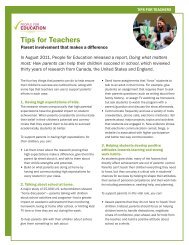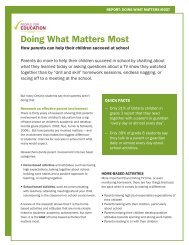Our Children Our Future Our Vision - People for Education
Our Children Our Future Our Vision - People for Education
Our Children Our Future Our Vision - People for Education
Create successful ePaper yourself
Turn your PDF publications into a flip-book with our unique Google optimized e-Paper software.
<strong>Our</strong> <strong>Children</strong>, <strong>Our</strong> <strong>Future</strong>, <strong>Our</strong> <strong>Vision</strong><br />
(c) Cultural Relevance<br />
“The cultural teachings that should accompany language instruction<br />
is very important… All communities have First Nation members<br />
who are the best to teach the language and culture component, but<br />
are not allowed to teach – due to lack of <strong>for</strong>mal training. I strongly<br />
disagree with this – who better to teach than someone who lives<br />
and practices what they are teaching.” (Councillor)<br />
There is also a growing recognition internationally that the inclusion of Indigenous Knowledge<br />
in First Nation education is key to improving educational outcomes <strong>for</strong> Indigenous children. 218<br />
Indigenous Knowledge must be at the core of Indigenous early learning experiences because it is<br />
Indigenous culture, language, values, and traditional approaches to healthy living and learning that<br />
define equality in early childhood education. 219 Given the suppression of Indigenous languages<br />
and the requirement to learn English, only 3 of the 65 Indigenous languages in Canada are strong<br />
enough to avoid extinction. Thus, the incorporation of Indigenous languages becomes that much<br />
more important in First Nation education. 220<br />
Much of the literature also refers to the importance of incorporating Indigenous knowledge as a<br />
means of decolonizing. 221 The many years of colonially-imposed laws and policies have had longterm,<br />
inter-generational impacts on our communities. 222 Residential schools were designed to bring<br />
about the “peaceful elimination of Indians”. 223 First Nation control over education and training of<br />
teachers is helping to replace years of colonialism with individual and collective action with an<br />
Indigenous focus. 224 In this way, students and teachers benefit from strengthening of culture and<br />
shedding colonization. But more resources have to be put into making Indigenous knowledge<br />
available in books, journals, theses, dissertations, and other <strong>for</strong>mats. 225 Sadly, cultural racism has<br />
been and continues to be a major impediment to moving <strong>for</strong>ward.<br />
While residential schools may have closed, the education in most provincial schools replicates the<br />
same content. Schooling is an institution of mainstream society and by <strong>for</strong>cing First Nations to par-<br />
218 R. Kitson, J. Bowes, “Incorporating indigenous ways of knowing in early education <strong>for</strong> Indigenous children” (2009)<br />
34:4 Aus. J. Early Childhood 81-89 at 81.<br />
219 J. Hare, J. Anderson, “Transitions to early childhood education and care <strong>for</strong> indigenous children and families in<br />
Canada: Historical and social realities” (2010) 35:2 Aus. J. of Early Childhood 19-27 at 2.<br />
220 G. Labercane, W. McEachern, “Striving <strong>for</strong> success: First Nations education in Canada” (1995) 115:3 J. of Ed. 322 at<br />
323.<br />
221 J. Orr, D. Freisen, “ ‘I think what’s happening in aboriginal education is that we’re taking control’: Aboriginal teachers’<br />
stories of self-determination” (1999) 5:2 Teachers & Teaching 219 [Aboriginal teachers].<br />
222 RCAP, vol.1, supra note 6 at 333-410. Shingwauk’s <strong>Vision</strong>, supra note 6. Unsettling the Settler Within, supra note 6.<br />
223 What other Canadian kids have, supra note 208.<br />
224 Aboriginal teachers, supra note 221.<br />
225 M. Battiste, et al., “Decolonizing <strong>Education</strong> in Canadian Universities: An Interdisciplinary, International, Indigenous<br />
Research Project” (2002) 26:2 Can. J. of Native Ed. 82-95 [Decolonizing <strong>Education</strong>] at 91.<br />
Chiefs of Ontario<br />
50


